TL;DR – The 5-Second Answer…
For people who have never picked up a guitar, the bass is easier than the guitar. However, learning bass is challenging and will still take dedication and time to get good.
This article will explain why bass is easier and when it’s more challenging in comparison to a regular guitar.
Let’s get started!
Bass Guitars Role vs. Guitars Role
The primary function of the bass guitar is to provide rhythm and low-end frequency support. The bass guitar often follows the song’s chord progression and keeps time with drums and percussion. As such, it is essential to provide a melodic, rhythmic groove that other instruments can build upon and follow.
On the other hand, the role of a regular guitar is more varied and depends mainly on the music style.
In rock music, guitars can be used to play lead melodies or solos and provide some rhythm accompaniment. It can also thicken a sound or extend the bass frequencies to be more full spectrum with chords or power chords.
In jazz music, standard guitars “comp,” which is playing chords to support a melody or solo, or as a soloing/improvisational instrument itself, sometimes referred to as blowing.
Bass Strings vs. Guitar Strings
The two apparent differences between bass guitar strings and regular acoustic or electric guitar strings are the size and number.
Standard bass guitars have four strings tuned one octave lower than an electric or acoustic guitar in standard tuning.
The strings on a bass guitar have a bigger gauge and thicker core than those on electric or acoustic guitars. This makes learning to play bass more painful on the fingertips than on an acoustic or electric guitar. This is due to having to push down harder to get the note to produce a clear sound.
The winner is…
Standard Guitar. Because the strings are much smaller on a regular guitar, they are easier to push down and will be less painful for beginners to learn on. Also, non-bass strings are cheaper than bass strings.
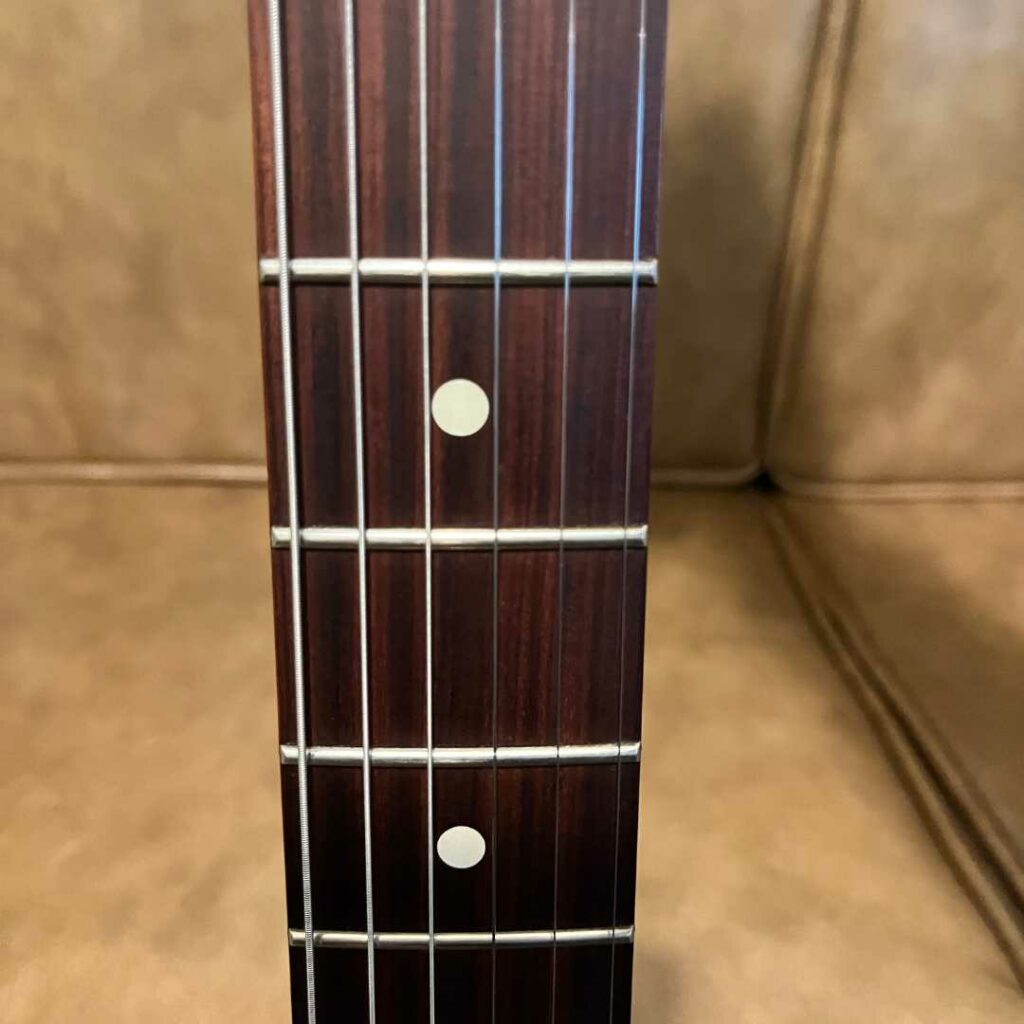
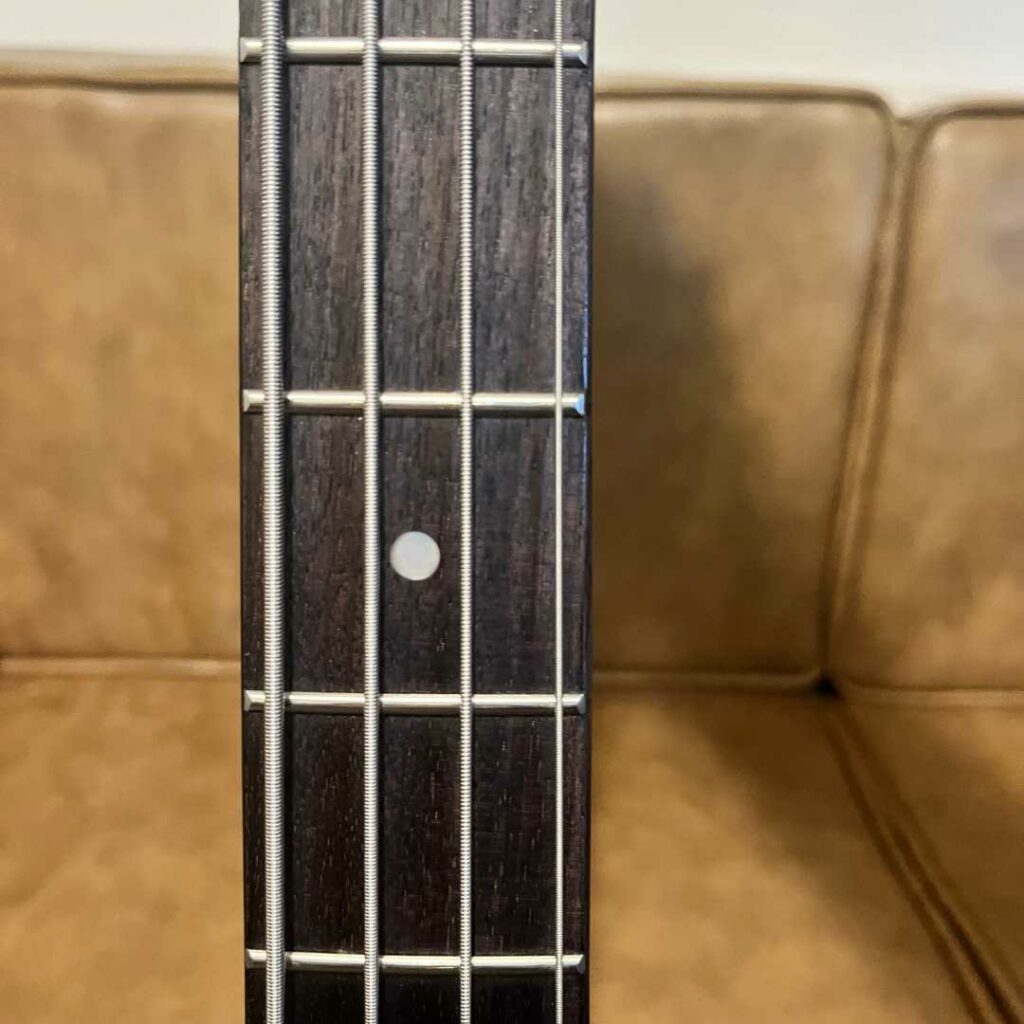
Bass Frets vs. Guitar Frets
The space between frets on bass guitars is more prominent than on a standard guitar. This has its advantages and disadvantages.
The advantage is that bass guitar players have a larger “landing zone” for each note. So for you out there who struggle with fine-motor skills, this will be a significant advantage.
However, there is a larger space between notes, so the stretch between frets may be painful and awkward if you have tiny hands.
The winner is…
It’s a tie. The winner of this bass vs. guitar category depends on the size of your hands. However, I’m inclined to have the win sway slightly towards bass.
If you have small hands, you may find it easier to fret an electric or acoustic guitar than a bass.
However, if you have larger hands and want more forgiveness when learning, an acoustic or electric bass could be the way to go.
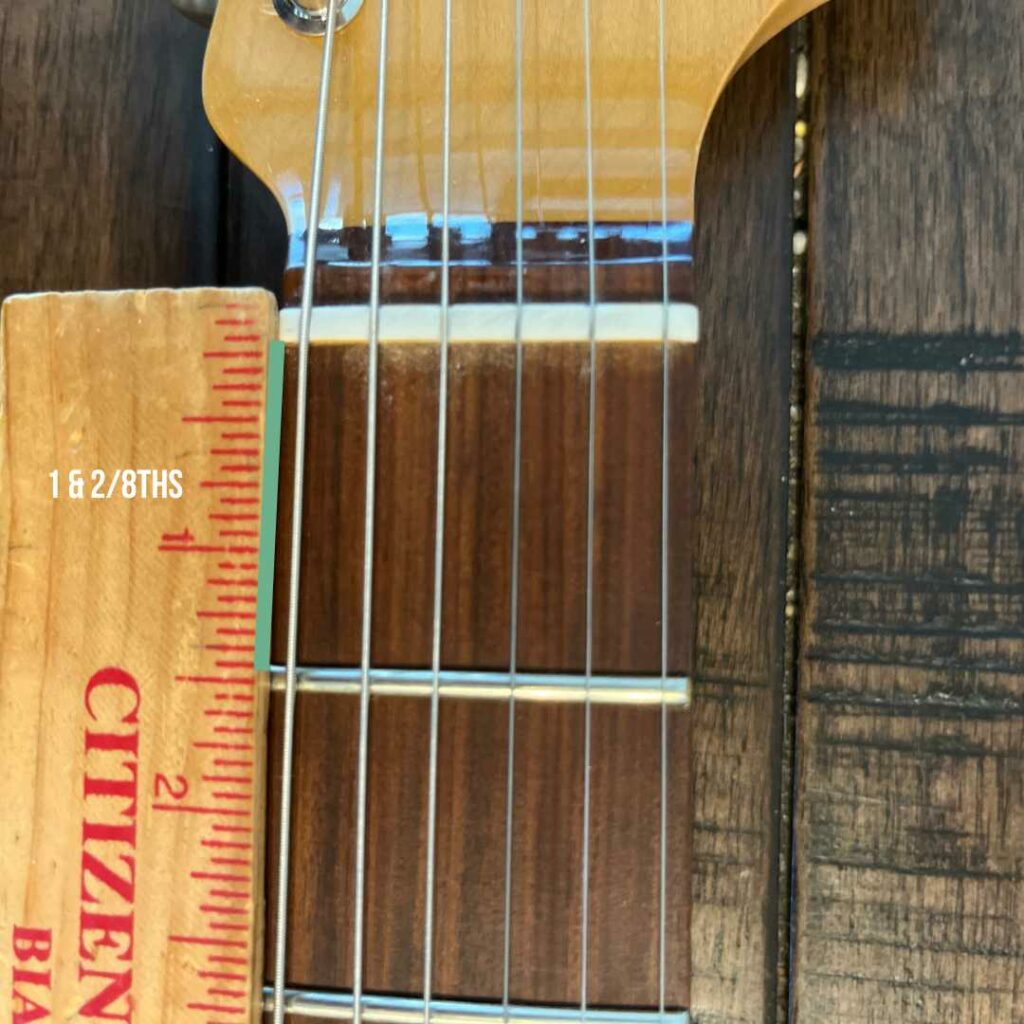
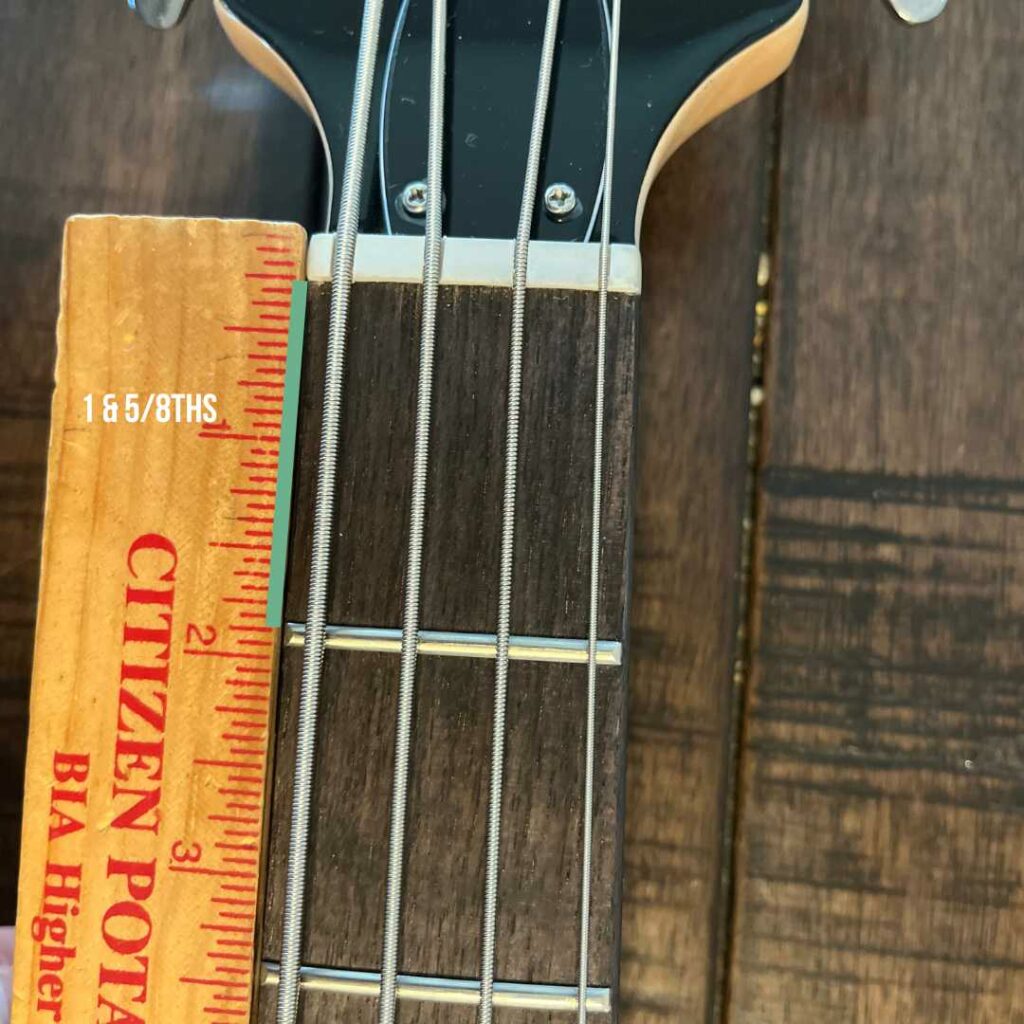
Bass Scale Length vs. Guitar Scale Length
The guitar’s scale length is the distance from the nut to the bridge/saddle. Scale length affects the amount of string tension, and shorter scale lengths give a more “slinky” feel to a guitar.
Bass guitars have a longer scale length than guitars. A full-scale bass guitar (or long bass) has a scale length of 34 inches. While a full-scale guitar is around 25.5 inches. This foot of difference can make bass guitars feel overwhelmingly large for children and smaller players.
However, you can also buy a short-scale bass or a short-scale guitar. Short-scale bass drops the scale length to 30”. This can make a bass more manageable for most beginner players.
The winner is…
Regular Guitar. There’s no way around it; shorter-scale guitars will be easier to play for beginners learning how to play guitar. Less string tension will make it easier to fret and sound notes.
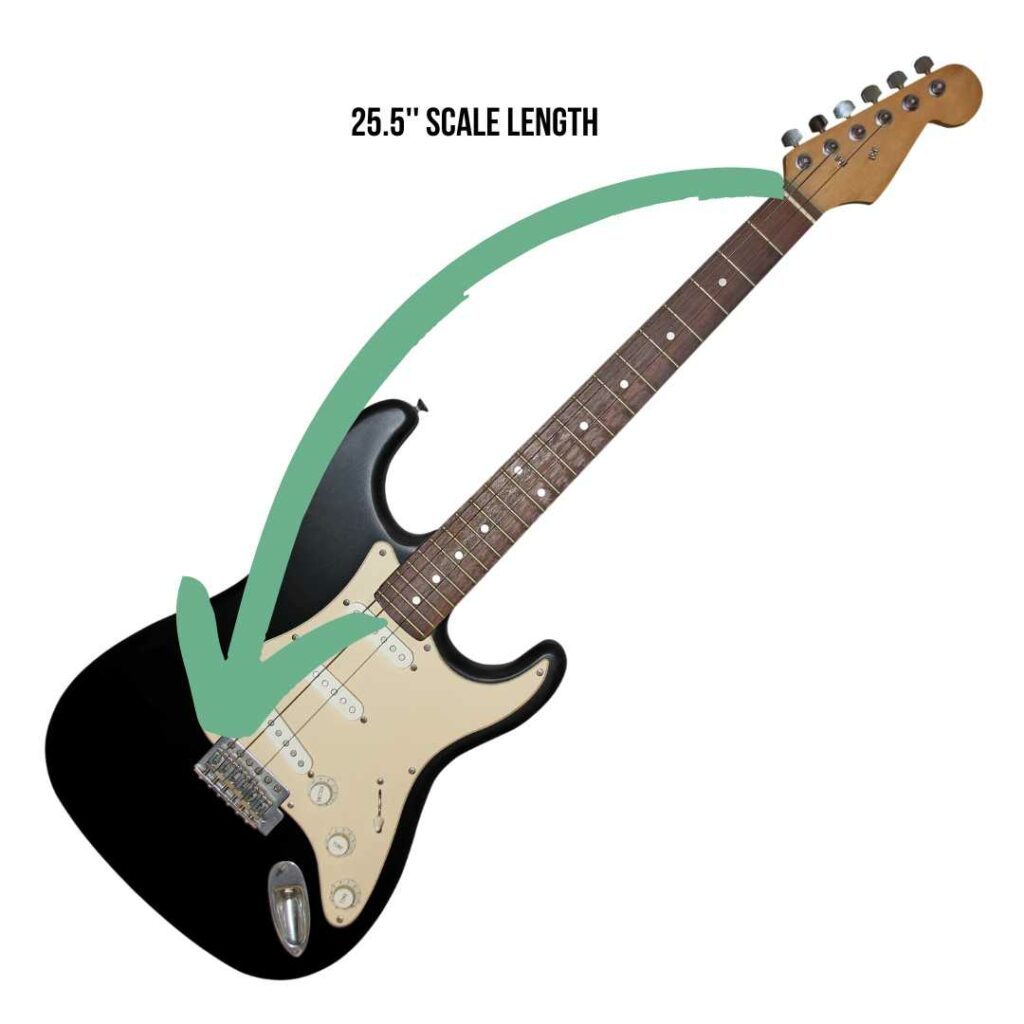
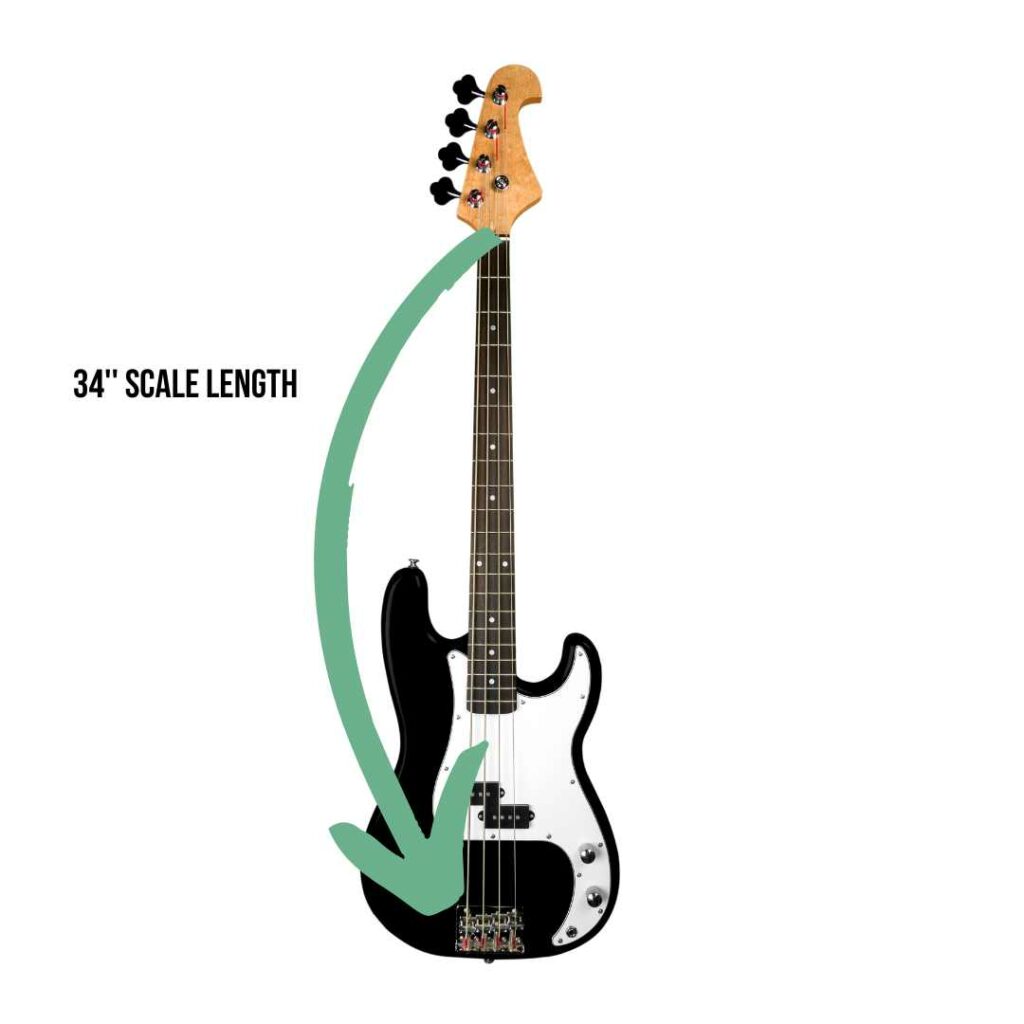
Bass Strumming vs. Guitar Strumming
Playing a standard guitar with six strings (or seven strings if you’re into that thing) has a mix of techniques beginners must learn, from full strums of guitar chords to single-note picking for scales.
While playing bass has a singular focus on single-note picking and scales. Because of the thicker strings of a bass, you can often learn your fundamentals without using a pick which can feel much more natural for a new guitarist.
There are more advanced techniques that both standard players and bass players will learn eventually. Still, in the beginning, bass playing is more user-friendly regarding learning rhythm and strumming.
The winner is…
Bass guitar. Learning guitar and scales on bass is much easier because you focus on a single string rather than chords (especially those pesky barre chords). Also, the thicker strings of the bass make it easier to strum with your fingers and not use a pick initially.
Bass Grooves vs. Guitar Grooves
Bass grooves provide a more low-end focused rhythm that creates an overall groove with the other instruments in the band. Bass playing brings melody to the song’s rhythmic structure. However, because the frequency range of bass takes up more space in a mix, there is a limitation to the harmonic sounds it can produce.
On the other hand, standard six-string guitars add more harmonic complexity to music due to their higher pitch range. Higher frequencies take up less space, so guitars can add more complex harmonic sounds to a song without clashing with other instruments.
Guitar parts typically add texture to a song, create counter-melodies from the main vocal line, or are the featured instrument in a piece of music.
Both bass and standard six-string guitar grooves play a significant role in popular music, providing different functions that work together to create unique soundscapes.
The winner is…
Bass. Playing bass grooves can be as simple as following the root note of a chord progression. This makes the bass guitar easier to learn songs over a traditional six-string.
Bass Tuning vs. Guitar Tuning
The tuning of a bass is the same as a traditional guitar. However, you have less to worry about because the bass has only four strings. However, there really isn’t a benefit to the number of strings an instrument has regarding tuning.
The winner is…
It’s a tie. Both instruments use the same tuning (not compared against a 7-string guitar) for the top four strings (bottom four if you want to be proper). So it depends on if it bothers you to tune an extra two strings on acoustic and electric guitars.
Learning Music Theory on Bass vs. Regular Guitar
Music theory is almost a dirty word in the guitar world. It’s extremely easy to circumvent learning theory because of the pattern-based nature of playing guitar.
When you play bass, it’s much easier to wrap your head around theory because of the limitation of playing on one string. You don’t have to worry about the notes within chords, and you can focus on the notes in a scale and the fretboard.
The winner is…
Bass. As a beginner, it’s much easier to learn the notes of scales and the notes on the fretboard when you narrow it down to single notes. However, as you progress, standard guitarist have an edge as they learn more complex harmony with chords.
Getting Gigs as a Bass Player vs. Getting Gigs as a Guitar Player
Bass players have an advantage when it comes to playing gigs. Let’s face it, most people gravitate towards acoustic and electric guitars. Because of this, you will likely have less competition in getting into bands.
So if your goal is to get up on stage and start playing with others as soon as possible, then bass is easier than guitar for landing gigs.
The winner is…
Bass. There is no doubt that electric guitar players outnumber bass players. The unofficial number I’ve heard is 5 to 1. If this is true, I have no idea. But I do know that the bass player for my band growing up was in multiple bands.
FAQ
Can guitarists play bass guitar?
Yes, guitarists can play bass. The two instruments share the same tuning, so it’s pretty easy for a guitarist to switch over to playing bass. That said, bass requires a different technique and mindset than guitar playing.
You can often tell when someone playing bass is a guitar player by how they phrase their scales. So don’t think that it is an easy transition!
Why learn bass instead of guitar?
If you are more interested in rhythm and the groove of the music, then learning bass will be more inline with your goals.
Bass is also great for introverts who don’t want all the attention on them and can be an excellent supporting player for the rest of the band.
Is bass more fun than guitar?
This depends on your definition of fun. Both bass and standard guitar are equally as fun in different ways.
Bass is more groovy, and locking in with rhythmic elements like drums adds a level of connectivity that can be exhilarating. While regular guitar offers more creativity and exploration with sonic textures and songwriting.
Should I play an acoustic or an electric bass guitar?
Acoustic basses are less popular than an electric bass. This is because acoustic basses are extremely difficult to be heard in a live context without amplification. And if you’re amplifying an acoustic bass, you might as well be playing an electric bass guitar.
So unless you have a great reason to purchase an acoustic bass (practicing in a small space), I’d suggest going electric.
The Bottom Line
So is bass easier than guitar? Well, the short answer is yes if you’re beginning your musical journey.
However, whether you play bass or regular guitar, it comes down to your goals and the type of music you want to make.
Overall, both instruments require dedication and practice to become proficient. So choose one that resonates with you and makes you excited about learning.
Thanks for reading!

